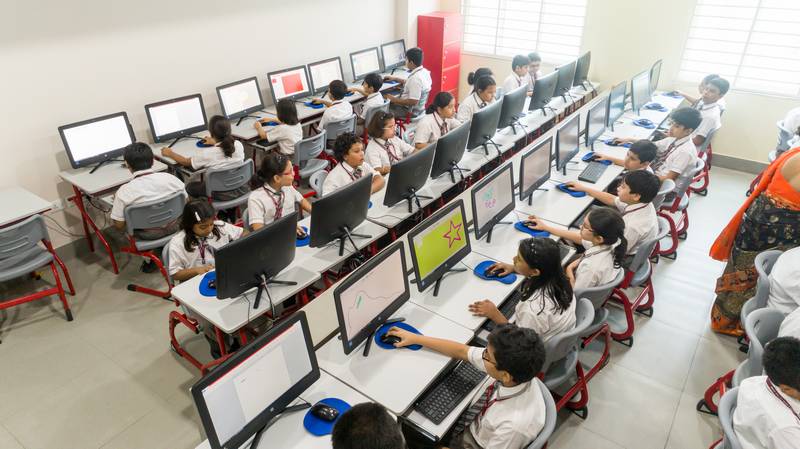
For the economic development of a country, Education plays an important role, and since the early days of Independence, India has always focused on improving the literacy rate for which even today the government runs many programs to promote Primary and Higher Education In India. In India, the importance of Education has always been valued by the government, which is reflected in our economic policies. Education is all about the process of teaching, learning, and training of students in schools and colleges to increase their knowledge and develop their skills hence enhancing the quality of their studies.
History of Indian Education
The Indian Education System has a rich and interesting history. It has its roots in the ancient ages where they followed the Gurukul system, where students used to reside in the house of their teacher until the teacher felt that he had imparted all that he could. They used to study various subjects such as Sanskrit, Scriptures, Mathematics, Metaphysics and the knowledge attained would be transferred to the future generations.
During the colonial era, the education system in India was changed when the British set up schools which followed the respective curriculum for subjects such as Mathematics, Science, etc. The ancient education system included more interaction with nature in comparison to the modern system, which is classroom-oriented. Indian Education system was improved when universities like Nalanda, Takshashila, Ujjain and Vikramshila were established.
The British founded the present education system of India in the 20th century. They declined the traditional method of education because they didn’t recognize the method. They gave more preference to western content and style which we still prefer.
Importance of School Education
In shaping a person’s social and professional growth, the school play a vital role. Schools in India mostly focus on nurturing the children to face the competitive world outside. Students capability is tested on the grounds of examination and assignments which further encourage them to study sincerely. On the basis of their marks, a student will be judged whether he/she is knowledgeable or not. Most of the activities oppose the education system in India as they believe in learning things by rote.
In India, as per the world bank report, there are more than 7, 40,000 formal schools, more than 3.6 million teachers are working on a full-time basis.
Latest Trend and present Education System In India

The Indian government considers education as a key area where drastic growth and development is required. So various future prospects have been considered and policies are drafted. The vision is to ensure that education in India is of the highest quality and available to the whole population without discrimination.
Indian Education is divided into different levels such as pre-primary level, primary level, elementary education, secondary education, undergraduate and postgraduate level. In India, the foundation of education is primary or elementary education later they go into secondary education, undergraduate and then postgraduate level which are termed as higher education levels. Our Indian Education System has been revamped a lot with better facilities, better study materials, improvement in teaching methods, etc.
Education Governing Boards in India are mentioned below:
Central Board of Secondary Education (CBSE)
Council of Indian School Certificate Examination
State Government Boards
National Open School
International Schools in India
Above all the Education Governing Boards, the Central Board of Secondary Education or CBSE is the most preferred boards in the country due to many reasons. It maintains uniformity among all the students across India. The board covers the general and basic knowledge required for a student to move forward in terms of education.
History Of CBSE Board in Indian Education System
The Central Board of Secondary Education popularly known as CBSE is established in 1962 with the sole purpose to make a common standard platform for every student in the country. In 1962, there were only 302 affiliated schools which now has increased to a whooping number of 18000+ affiliated schools in the country. In India, CBSE has set his standard high when it comes to education with its influential educational policies. It has reformed the education system of the country. The CBSE also has 141 affiliated schools in 21 other countries mainly catering to the needs of the Indian population there.
All the CBSE affiliated schools follow the same syllabus and all the textbooks are published by NCERT. It is the sole governing body responsible for the publications of the textbooks. On the official website, CBSE provides various study materials for students such as previous year question papers, syllabus, CBSE Sample Papers, etc in a way to help students in their exam preparation.
The main objective of the CBSE Board
- Without compromising the quality they provide academic activities to provide stress-free, child-centered and holistic education to all children.
- Collecting feedback from different stakeholders to analyze and monitor the quality of academic activities.
- It develops norms for implementation of various academic activities including quality issues; to control and coordinate the implementation of various academic and training programmes of the Board; to organize academic activities and to supervise other agencies involved in the process
- To adapt and innovate methods to achieve academic excellence in conformity with psychological, pedagogical and social principles.
- To encourage schools to document the progress of students in a teacher and student-friendly way
- To propose plans to achieve quality benchmarks in school education consistent with the National goals
- To organize various capacity building and empowerment programmes to update the professional competency of teachers
- To prescribe conditions of examinations and conduct public examination at the end of Class 10 and 12. To grant qualifying certificates to successful candidates of the affiliated schools.
- To fulfil the educational requirements of those students whose parents were employed in transferable jobs
- To prescribe and update the course of instructions of examinations
- To affiliate institutions for the purpose of examination and raise the academic standards of the country.
Advantages of Studying in CBSE Board
CBSE board is considered student-friendly and ensures that the students do not face a lot of pressure. The curriculum is designed in such a way that students can easily grasp the concepts and even the books are made interactive and interesting. In between the chapters, lots of fun activities are included in order to make the learning process more playful. When it comes to exam the board makes extra efforts to ensure that students actually learn from the entire process. The question papers are set in such a way that they test how much the students have learned.
While preparing for competitive exams like IIT, UPSC, JEE, etc the curriculum of CBSE will definitely help you a lot. CBSE helps the board students of Class 10 and 12 by guiding them with the correct study materials which they can find on their official website. The board CBSE also provides CBSE Sample Papers for Class 10 and 12 for students to practice for the upcoming board exam. It imparts quality education along with physical and mental growth and also encourages students to participate in co-curricular activities alongside studies. It also offers a lot of flexibility to the students to pursue their field of interest.



